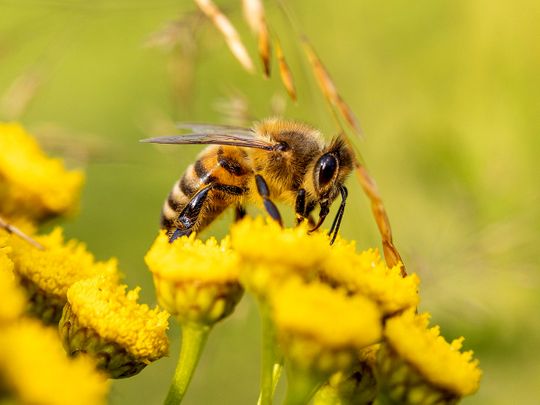
Apples, grapes and peaches wouldn’t exist if it were not for bees. In fact, about 84 per cent of food grown for our tables comes from pollination. So the next time you chew on an almond or sip on coffee, picture the tiny helpers tirelessly flitting from one flower to the next to bring you your next snack.
Click start to play today’s Crossword and ponder over issues threatening our food and agriculture.
Pollination happens when bees (and other insects like butterflies and wasps) carry pollen from one flower to the next on their nectar hunt, allowing plants to reproduce. While other pollinators contribute to some of this, bees are differently motivated: flowers are their only source of food. Their fuzzy bodies with stiff hairs are the perfect pollen magnets, too. It’s a happy relationship, one that has varied our diet considerably.
Stressed out bees
In 2006, something tipped the scales of this harmonious balance. Beekeepers reported that bee colonies were mysteriously dying out, a phenomenon which was later named the Colony Collapse Disorder (CCD). During a colony collapse, bees suddenly clear out the hive, leaving their queen and larvae behind. Though the cause is yet to be known, researchers point out other bee stressors – climate change, pesticides and loss of flowering habitat.
In conversation with Samuel Ramsey, a honeybee researcher at the U.S. Department of Agriculture, the non-profit American broadcaster NPR reported that we’ve been losing about 30 per cent of bees every year for the past decade. And while we could survive without them (wind-pollinated crops rice and corn exist), our table spread would be quite a sad sight.
Monoculture farming is another notorious bee-stressor. Farmers find that when they grow only one type of crop, there is more yield. Bees aren’t too ecstatic about this practice since it leaves them with one type of pollen. A limited diet means a weak immune system, which in turn makes them vulnerable to harmful chemicals in pesticides.
How can we 'bee' of help?
Plant diverse flowers in your garden and don’t snip at wildflowers. The World Wide Fund for Nature advises on leaving a portion of the garden untended. Also, drops of sugared water can do wonders for an exhausted bee.
Will you become a protector of the bees? Play today’s Crossword and tell us at games@gulfnews.com.









